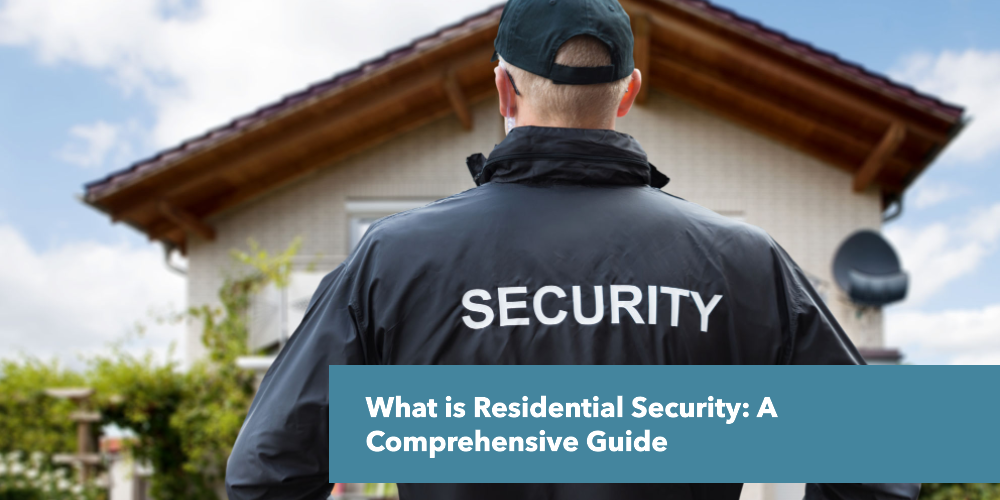What is a Residential Security?
Residential security refers to systems and practices designed to protect your home, belongings, and family from threats like burglary, vandalism, or unauthorized access. It combines physical barriers, technology, and monitoring to ensure safety.
What are the Types of the Residential Security?
Residential security systems protect your home through multiple layers which is including physical security, surveillance systems, alarms, access control, security personnel, environmental monitoring, and cybersecurity.
Types of Residential Security
Physical Security: Includes locks, deadbolts, window bars, and gates. High-quality deadbolts (e.g., Grade 1) resist forced entry for up to 10+ strikes. Reinforced doors/windows add structural resistance.
Surveillance Systems: Cameras (indoor/outdoor) with motion detection, night vision, or 1080p 4K resolution. Smart cameras send real-time alerts to your phone via apps like Ring or Nest.
Alarm Systems: Sensors (door/window, motion, glass-break) trigger loud sirens (85–110 dB) and notify monitoring centers. Professionally monitored systems (24/7) dispatch emergency services, reducing burglary risk by up to 60%.
Access Control: Smart locks (keypad, fingerprint, or app-based) let you grant temporary access. Biometric systems use unique identifiers (e.g., fingerprints) for entry.
Security Personnel: Guards or patrol services provide physical presence. Gated communities often use staffed checkpoints to verify visitors.
Environmental Monitoring: Smoke detectors, CO sensors, and flood alarms (e.g., water sensors with 90dB alerts) prevent non-intrusion hazards.
Cybersecurity: Protects smart devices (cameras, locks) from hacking. Use strong passwords (12+ characters) and enable two-factor authentication (2FA) for connected systems.
What are the Benefits of the Residential Security?
The benefits of the residential security offers deterrence against crime, remote monitoring, faster emergency response, property protection, insurance discounts, peace of mind, and increased home value.
Deterrence Against Crime: Visible systems (cameras, alarms) reduce burglary risks by up to 60%, as most intruders avoid homes with security measures.
Remote Monitoring: Smart cameras/apps (e.g., Ring, Nest) let you check your home in real time. 67% of users report feeling safer with remote access.
Faster Emergency Response: Monitored systems alert services within 30 seconds of triggers (e.g., fire, break-ins), cutting response times by 50% vs. manual calls.
Property Protection: Environmental sensors (smoke, flood) detect hazards early, reducing damage costs by up to 34% (e.g., water sensors prevent $10k+ flood repairs).
Insurance Discounts: Insurers often offer 5–20% discounts for homes with alarms, saving you $100+ annually on premiums.
Peace of Mind: 90% of users report reduced anxiety about intrusions or emergencies when using security systems.
Increased Home Value: Smart security features boost resale value by 3–5%, appealing to safety-conscious buyers.
Each benefit addresses practical, financial, or emotional needs. Tailor systems to maximize protection and savings for your home.
What are the Duties and Responsibilities of the Residential Security Guard?
The Duties and Responsibilities of the residential security guards handle patrolling, surveillance monitoring, access control, emergency response, incident reporting, enforcing rules, and customer service.
Patrolling: You conduct regular walks (e.g., hourly rounds) to inspect doors, windows, and grounds, deterring trespassing. Studies show visible patrols reduce break-in risks by up to 40%.
Surveillance Monitoring: You watch live camera feeds and motion sensors, alerting authorities within 2–5 minutes of suspicious activity (e.g., loitering).
Access Control: You verify IDs, manage visitor logs (e.g., 10–20 daily entries), and operate gates/intercoms to block unauthorized entry. For more information, learn more about Access Control Security from our blog.
Emergency Response: You act first during fires, medical crises, or intrusions. Training in CPR (required for 85% of roles) improves survival rates by 45%.
Incident Reporting: You document details (time, location, involved parties) of breaches or accidents within 24 hours for legal/insurance purposes.
Enforcing Rules: You ensure compliance with community policies (e.g., noise curfews, parking), resolving 70–80% of disputes through warnings.
Customer Service: You assist residents with safety concerns (e.g., lost keys), boosting satisfaction by 30% in surveyed communities.
Each duty prioritizes safety, quick action, and clear communication. Training and attentiveness ensure you protect residents and property effectively.
What are the Job Roles of the Residential Security?
The Job Roles of the Residential security involves roles like security guards, surveillance operators, alarm technicians, access control specialists, cybersecurity analysts, patrol officers, and security consultants.
Security Guards: Monitor properties, check visitors, and respond to threats. You’ll need physical fitness and basic training (e.g., 40-hour certification courses). Average salary: 30,000–45,000/year.
Surveillance Operators: Manage live camera feeds and alert authorities to suspicious activity. Proficiency in video analytics tools (e.g., Milestone XProtect) is key.
Alarm Technicians: Install and maintain alarm systems (e.g., ADT, Honeywell). Certifications like ESA (Electronic Security Association) boost earnings (45,000–65,000/year).
Access Control Specialists: Design and manage smart locks, biometric systems, or keycard entry. Experience with IoT devices (e.g., August Smart Locks) is valued.
Cybersecurity Analysts: Protect smart home systems from hacking. Certifications (e.g., CISSP) can raise salaries to 70,000–100,000/year.
Patrol Officers: Conduct mobile checks in gated communities. Requires a driver’s license and communication skills.
Security Consultants: Assess risks and recommend systems (e.g., cameras, alarms). Experience reduces client theft risks by 25%+.
Each role focuses on specific skills, from hands-on monitoring to technical expertise. Salaries and training vary, but all prioritize keeping homes safe.
Hire Residential Security Guard at Riverside
Uplift your business security with premier security guard services in Riverside. At Hyguard Security Inc., our expert officers specialize in enforcing access protocols, monitoring entry points, and promptly resolving any security issues. Reinforce your facility’s defenses and achieve full compliance with our reliable access control solutions. Reach out today or request a quote to learn how we can enhance your security and protect your invaluable assets.

